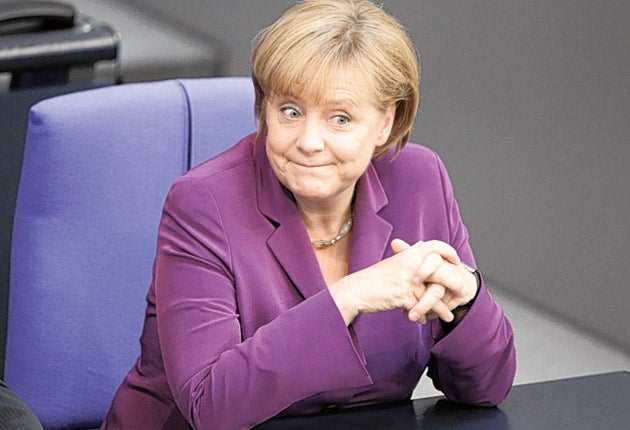World Focus: How 'Ms World' found her political fortunes fading

Your support helps us to tell the story
Our mission is to deliver unbiased, fact-based reporting that holds power to account and exposes the truth.
Whether $5 or $50, every contribution counts.
Support us to deliver journalism without an agenda.

Louise Thomas
Editor
By Germany's obediently kept political standards, Angela Merkel's fall from grace is unprecedented. She used to be revered as "Ms World" by the country's media; as little as six months ago, she was rated Germany's most popular post-war Chancellor ever. But yesterday most political commentators were asking whether the leader of Europe's biggest economy would survive the next 12 months.
"If Angela Merkel does not start showing more courage from now on, it will be the beginning of the end of her tenure as Chancellor," is how one analyst put it in Der Spiegel magazine. There were scores of other editorials in a similar vein.
Wednesday's German presidential election is the cause of all the dire predictions. It turned into a disaster for Ms Merkel. The Chancellor and her candidate, her chosen candidate, Christian Wulff, were humiliated: Mr Wulff failed to secure a majority in first two rounds of voting and only scraped through in the end, nine hours later, after a third vote – despite the fact that Ms Merkel's coalition enjoys a clear majority in the assembly.
Mr Wulff's dismal performance was the latest and most glaring demonstration of the lack of support Ms Merkel currently has within her warring coalition of conservatives, liberals and Bavarian conservatives. Since the alliance came to power last September, the coalition has done little but bicker. The Chancellor's popularity is down from around 80 per cent last September to 50 per cent. She was able to sell herself to voters as a national saviour during the 2008-09 financial crisis, but came badly unstuck over the eurozone crisis.
She upset the markets and most other EU leaders with claims that the euro was "in danger". The impression given, not only to Germans but to the world, was that Angela Merkel had was dithering and out of control.
The voters punished her severely in key regional elections. One of the consequences is that her coalition has lost its majority in Germany's upper house, and will now have difficulty getting its reforms made law.
Ms Merkel's answer to the eurozone crisis has been to "set an example" to Europe with a €80bn German austerity budget – its biggest ever – at a time when German unemployment is dropping and its exports are starting to boom.
But in the face of her growing unpopularity with the electorate and within her coalition, the package may be politically impossible. Next year she faces six key state elections. Her coalition looks so fragile that if its parties perform badly, her government could collapse in the aftermath of just one of them.
Subscribe to Independent Premium to bookmark this article
Want to bookmark your favourite articles and stories to read or reference later? Start your Independent Premium subscription today.
Join our commenting forum
Join thought-provoking conversations, follow other Independent readers and see their replies
Comments